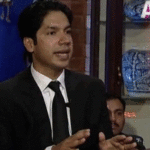The Big Question: Have military courts proved effective? Should they be given an extension?
By Newsline Admin | Opinion | Published 6 years ago
Shahzad Chaudhry is a political analyst and a retired air vice-marshall in the Pakistan Air Force.
 Pakistan breathes in relative peace. Compare it to what 2008 had brought: the then FATA (Federally Administered Tribal Areas) was occupied by militant groups who had escaped the post-9/11 American assault in Afghanistan; local militants, under the larger rubric of Islamic resurgence, were threatening to march to Islamabad and life in general had been restricted to the indoors for most citizens, who constantly looked over their shoulders for fear of a suicide blast when in public spaces.
Pakistan breathes in relative peace. Compare it to what 2008 had brought: the then FATA (Federally Administered Tribal Areas) was occupied by militant groups who had escaped the post-9/11 American assault in Afghanistan; local militants, under the larger rubric of Islamic resurgence, were threatening to march to Islamabad and life in general had been restricted to the indoors for most citizens, who constantly looked over their shoulders for fear of a suicide blast when in public spaces.
Pakistanis lived in a bunkered mindset. Karachi, the hub of the country’s economic activity, stood paralysed. Thankfully, today the writ is back, the state secure and the society free of fear.
This is no mean achievement.
Not all of it was achieved by trying the apprehended terrorists in military courts. Some 7,000 lives were lost in a war that is still being fought to counter those who meant to do harm to the society and state. In military terms, this has been one exemplary counter-insurgency and a counter-terror war, by a conventional military that was quick to learn and adjust to its new nature. The military courts, though, filled the gap for a laggard and a lethargic criminal justice system which, to date, remains archaic and anchored in time.
The National Action Plan, which aimed at earnest reform, failed to materialise. Thus, military courts were born beyond the Anti-Terrorism Courts (ATCs), which had also failed to deliver expeditiously. Reasons for such lackadaisical performance are aplenty. The state of the law and the regular courts remains the same. Hence the need for an extension in the tenure of military courts.
However, our complex civil-military equation suggests otherwise. The fall-back to a fear of a domineering military and a recall of its overpowering hold, is enough to inspire caution. Despite the various safeties – including a sunset clause and civilian control over what goes before the military courts – the strong tendency to resort to the principle of civilian supremacy, within the larger rubric of ‘due process’ and ‘fair-trial,’ is something that should make us pause for a moment and reconsider.
As the nation fights on in the next phase of eliminating the remnants of a long war, and as the legal resort remains an essential cog in the path to normalcy, the politics of the military courts is an essential accompaniment.
Pakistan is lucky to have successfully emerged from a debilitation which such wars have wrought across the world. Though the final round is yet to be played out – in which military courts can help a great deal – most of the tribulation is behind us. The rest of the journey may become longer and costlier in the absence of military courts, but the end is just round the corner. If the political cost of keeping military courts is likely to compromise a nation’s journey towards a more transparent, honest and a corrupt-free future, it is worth giving the military courts a miss.
It is largely believed that those political parties opposing the extension of the military courts aren’t doing so only on principle, but to seek some backdoor compromise for themselves: perhaps an easement in their ongoing predicament in courts for alleged corruption and misappropriation, in return for an extension to military courts.
Muhammad Ahmed Pansota is a lawyer based in Lahore
“When the sun has set, no candle can replace it.” – George R R Martin (novelist)
 In the wake of terrorism, the National Assembly, through the 21st Amendment, introduced military courts. The said amendment came with a clause whereby the sun would set on it in two years. The arrested terrorists were subjected to trials before military courts, through which a majority of them were sentenced to death.
In the wake of terrorism, the National Assembly, through the 21st Amendment, introduced military courts. The said amendment came with a clause whereby the sun would set on it in two years. The arrested terrorists were subjected to trials before military courts, through which a majority of them were sentenced to death.
In those two years, the government was expected to sort out issues leading to the creation of military courts, which varied from improving the criminal justice system to training the law enforcement agencies through the use of sophisticated methods. Qazi Faez Isa, a Justice of the Supreme Court, made things easier for the government by highlighting various issues and their solutions, in the Quetta Commission Report. The implementation of the National Action Plan (NAP), drafted in consultation with stakeholders, took the shape of a ‘reactionary plan’ of sorts, as opposed to an ‘action plan.’
The NAP, owned by the military in letter and spirit, initially made sense and received unprecedented levels of support and cooperation from across the country’s political spectrum, but later all the stakeholders resiled from its true spirit. The NAP consisted of a 20-point agenda, which I, as a practicing lawyer, welcomed in the first year of my law practice. But given the non-implementation of its agenda, I increasingly began to realise how Utopian it was. I deliberated over the transitional shift on the part of the legislature from general law to special law, eventually leading to the promulgation of the 21st Constitutional Amendment, and the provision of a two-year sunset clause. Now, that too is about to lapse and the government is interested in renewing the tenure of military courts.
Judgments passed by military courts have, on numerous occasions, been reversed by the superior courts, who have acquitted convicts mainly due to a lack of substantial evidence, an unfair trial, violation of Articles 4, 10-A, 12 and 25 of the Constitution, as well as of Section 91 of the Pakistan Army Act, or the absence of jurisdiction with the military courts.
Consequently, despite the introduction of military courts, the menace of terrorism remains, seemingly uncontrollable, and continues to loom large over the public. The government, instead of working on the core causes of terrorism, has once again decided to extend the tenure of military courts. It raises serious questions regarding the government’s ability to control the factors that led to the creation of these courts in the first place.
The government needs to revisit its policies and priorities. The seriousness of the incumbent government can be gauged by its inability to appoint a federal minister for interior affairs six months down the road. The sun must set to give way to a new dawn, where those responsible for dealing with terrorism step up to the challenge.
Imtiaz Gul is the head of the Centre for Research and Security Studies
 Official statistics suggest that ever since their inception over two years ago, the military courts handled 717 cases and finalised 546 of them. The courts awarded death sentences to as many as 310, terrorists while 234 were awarded rigorous imprisonment of varied durations, ranging from life imprisonment to five years. Two accused were also acquitted.
Official statistics suggest that ever since their inception over two years ago, the military courts handled 717 cases and finalised 546 of them. The courts awarded death sentences to as many as 310, terrorists while 234 were awarded rigorous imprisonment of varied durations, ranging from life imprisonment to five years. Two accused were also acquitted.
Out of the 310 convicts only 56 – 18 per cent – were sent to the gallows. And these executions were carried out following the completion of the legal process, which included their appeals in superior courts and the rejection of mercy petitions both by the army chief and the president. The execution of the remaining 254 terrorists is pending completion of legal process in higher courts. This means that despite fulfilling the entire string of legal formalities, a staggering 82 per cent of the ‘jet black’ terrorists could potentially escape capital punishment.
Contrast this with the monumental anti-terror effort by all civilian and military institutions and the ensuing results: a whopping 50 per cent (approximately) reduction in terrorism-related violence through kinetic, non-kinetic and intelligence-based operations.
It will indeed be unfair to attribute this marked decline in violence to the military courts. Much more than this small deterrent, it has been the relentless operations – Zarb-e-Azb and Raddul Fassad – in tandem with the counter-terrorism departments’ continued preemptive work, that has led to the cumulative dramatic decrease in incidence of terrorism.
It is indeed the security paradigm shift at the highest civil and military levels that has produced results – which even the US Senator Lindsey Graham acknowledged during his visit to Islamabad last month.
Gradual efforts are underway to extricate the country from the baggage of the past four decades. This is the only way to make up for the lost economic development opportunities. Pakistan must recapture its economic relevance in the world. This is what the Chinese have been advising Pakistan to do and the advice, it seems, is being taken well.
Now, at a time when the top leadership is determined to “transform Pakistan from a security-centric to a development-focused state,” the best course would be to discard altogether the debate on whether the military courts should be revived or not. The real deterrence is the doctrinal shift that is distinctly visible within various tiers of political governance and the security apparatus.
If discussions with key decision-makers were any indicator, a conscious big course-correction, inspired apparently also by China, is underway, with the objective of culling all the godzillas that the war on terror had given birth to.
In this encouraging context, the military courts lose their sting as well as relevance. There is no need for them at all if the intention of sternly dealing with all rogue elements is sincere. Why should the government and the army concede to the opposition on other critical fronts, just for the sake of reviving military courts? The best answer to the military courts is immediate revision of the dated Criminal Procedures Code (CrPC) and the Civil Procedures Code (CPC), to avoid long delays and facilitate quicker and inexpensive justice delivery.
Both the military and the government should better spend their time and energy on devising strategies for deradicalising cadres of banned outfits. In the long-run, salvation and deterrence lies not in military courts, but in long-term, indigenous reform programmes to wean away radicals and potential allies of externally-driven terrorist outfits from the path of violence.
Muhammad Ismail Khan works with an Islamabad-based think tank that specialises in peace and security issues.
 In March 2019, military courts will cease to function. The debate, once again, is whether or not their tenure should be extended. These courts have been operating since 2015, in response to the dastardly attack on the Army Public School in Peshawar, in December 2014.
In March 2019, military courts will cease to function. The debate, once again, is whether or not their tenure should be extended. These courts have been operating since 2015, in response to the dastardly attack on the Army Public School in Peshawar, in December 2014.
It is not the first time that their extension is being debated. The original courts were set up in 2015 for a period of two years. When the two-year period expired, a similar debate arose.
Proponents of these courts say that the country’s criminal justice system is too weak to try militants. The courts allow them to roam free, either for want of evidence or out of fear. Militants fear conviction, especially death, and the military courts ensure the delivery of what they refer to as ‘speedy justice.’ The military courts were established parallel to the lifting of the moratorium on the death penalty (put in place since 2008).
The military courts were initially thought of as an extraordinary measure taken in extraordinary circumstances. The assumption was that during the period in which these courts functioned, the country’s normal criminal justice system – which includes the judicial system as well as the law-enforcement mechanism and prosecution – will strengthen.
As things currently stand, the criminal justice system still leaves much to be desired. Otherwise, the debate over military courts would not have stirred again. One of the points of National Action Plan (NAP), the country’s counter-terror plan, calls for strengthening the criminal justice system, but the progress on that front has not been made.
Critics question the utility of the military courts and argue that suicide bombers would be least deterred by death, or any penalty for that matter. The courts instead have the potential to militarise the entire judicial system.
It is important to understand that many institutions have failed in countering terrorism. It is collective failure. And rather than taking responsibility, these institutions blame each other, including the justice system.
While on the one had the criminal justice system is accused of being weak (the rationale behind military courts), it is, on the other hand, also viewed as being notorious for carrying out arbitrary actions at the behest of law enforcement agencies. Forensic experts view this dichotomy as a result of a lack of focus on the collection of scientific evidence during investigations – an area that needs greater emphasis.
While the civilian supremacists term the military courts as a signal of the militarisation of the justice system, the armed forces argue that they were created through the proper parliamentary process. Yes, parliamentarians did sign on it – albeit rather reluctantly. The courts were created under a constitutional amendment and later extended through another amendment. Constitutional amendments are no small tasks. This merely shows that no matter how undemocratic a step appears to be, constitution-mandated processes cannot be circumvented. Similarly, it is the federal government that sends the names of the people to be tried in military courts – the term used for them is ‘jet black terrorist.’
Moreover, the military courts seem to be a bargaining tool between the armed forces and the civilians. Both sides – senior politicians from mainstream parties and military officials – make public their perspectives on whether or not the courts are required. Yet for all the opposition, the results seem to be in favour of the military courts. Similar points are raised whenever there is a discussion on the extension of, say, the Sindh Rangers in Karachi.
Although the higher courts were set aside, their authority never ceased. In August 2015, the authority of reviewing the courts remained vested with the Supreme Court, even though it allowed that the military courts be retained. Similarly, in 2018, the Peshawar High Court set aside convictions of 73 persons found guilty of terrorist activities, overturned their sentences, maintaining that the charges were not proven beyond reasonable doubt.
But what is important to understand is that the militarisation of civilian space is increasingly being resisted. Nationalist parties in Balochistan have, for instance, repeatedly called for a demilitarisation of areas in the province. One of the parties has even based its alliance with the central government of PTI on similar conditions. Similarly, in FATA, an entire movement emerged that basically revolved around the demilitarisation in parts of those areas.
Mainstream parties, too, are pressurised by their constituents to this end. Their inability to secure space for themselves will work to their disadvantage and can spiral other forces, who are eager to claim authority with much vigour. n


